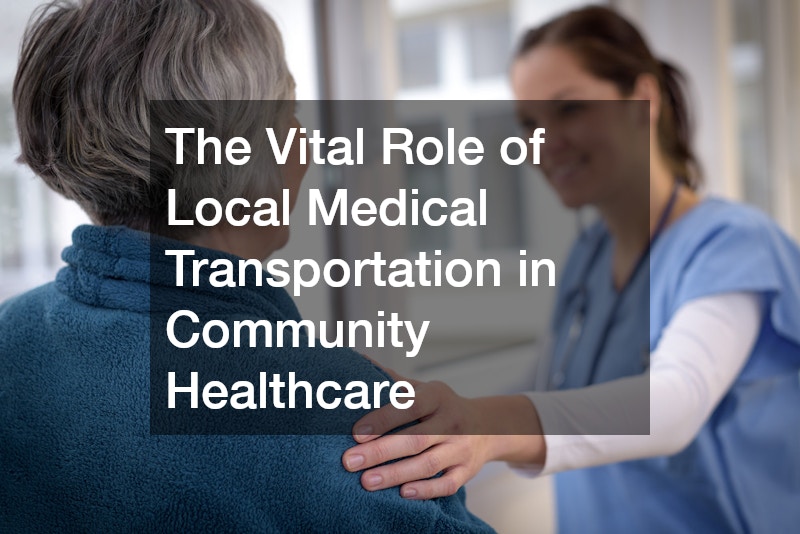

In any thriving community, access to timely and reliable healthcare is a cornerstone of well-being. Yet, for many individuals, reaching medical appointments or accessing essential treatments isn’t always straightforward. This is where local medical transportation becomes indispensable. Designed to assist individuals with mobility challenges, chronic illnesses, or lack of personal transportation, this service ensures that healthcare is accessible, consistent, and effective—regardless of a person’s physical or logistical limitations.
Enhancing Access to Healthcare Services
One of the greatest benefits of local medical transportation is its ability to eliminate a critical barrier to healthcare: access. Millions of people across the country miss appointments each year simply because they lack a safe, reliable way to get there. Whether due to age, disability, or temporary injury, some individuals cannot drive themselves or rely on public transit. Local medical transportation provides a dependable option for these patients to reach primary care physicians, specialists, dialysis centers, rehabilitation facilities, and more.
This consistent access is particularly important for individuals managing chronic conditions such as diabetes, kidney disease, or cancer. Missing treatments or follow-up appointments can lead to complications that diminish quality of life and result in emergency care. Local transportation services help bridge that gap by ensuring patients can maintain their treatment schedules without disruption.
Supporting Senior and Disabled Populations
As communities age, the demand for transportation services that accommodate the specific needs of older adults and individuals with disabilities continues to grow. Local medical transportation services often feature vehicles equipped with wheelchair lifts, oxygen tanks, and professionally trained drivers who understand how to assist passengers with care and sensitivity. These services empower aging residents to continue living independently while receiving necessary medical attention on a regular basis.
Additionally, these transportation options provide peace of mind for caregivers. Knowing that a loved one is safely transported to and from medical appointments allows family members to focus on other responsibilities without compromising their relative’s well-being.
Promoting Preventive Care and Early Detection
Reliable transportation plays a direct role in promoting preventive care, which is essential for early detection and the successful management of potential health concerns. Routine checkups, screenings, and diagnostic tests are often the first step in identifying health risks before they become severe. Unfortunately, transportation issues frequently deter individuals from seeking out preventive services until symptoms worsen.
With local medical transportation services readily available, more individuals are encouraged to prioritize routine visits and follow-through with doctor-recommended checkups. This proactive approach not only improves individual health outcomes but also reduces the overall strain on emergency services and hospital systems.
Reducing Stress and Encouraging Comfort
Medical visits can be stressful, especially when a person is uncertain about how they’ll get there or back home afterward. Local medical transportation offers a predictable and stress-free solution. Patients can count on door-to-door service, scheduled pickups, and drivers who understand the unique emotional and physical demands that medical travel may involve.
Unlike public transit or rideshare services, local medical transportation is purpose-built for health-related travel. The goal isn’t just getting from point A to point B—it’s ensuring the journey is safe, calm, and comfortable. For those undergoing chemotherapy, physical therapy, or surgical recovery, this added level of care can make a significant difference in their overall experience and recovery process.
Strengthening Public Health at a Community Level
Beyond the individual benefits, local medical transportation has a broader impact on community health. By helping residents attend their appointments, the service supports the continuity of care and reduces missed or delayed treatments. This, in turn, contributes to lower hospitalization rates and better public health outcomes.
When healthcare is easier to access, more people use it regularly. This leads to earlier diagnosis, better medication adherence, and fewer complications from chronic illness. The long-term effect is a healthier population and a more efficient healthcare system. Community health initiatives often rely on transportation services to facilitate wellness programs, vaccination drives, and mobile clinics—all of which depend on reliable movement of patients and resources.
Encouraging Independence and Dignity
Perhaps one of the most underappreciated benefits of local medical transportation is its role in preserving independence. For individuals who can no longer drive or who live far from family, the ability to get to appointments on their own terms is incredibly empowering. It reinforces a sense of autonomy and dignity, especially for seniors or those with disabilities who may already feel a sense of dependence.
These services also contribute to mental well-being. Being able to keep appointments, communicate directly with healthcare providers, and maintain a sense of routine helps people feel connected and cared for, both physically and emotionally.
A Silent Yet Essential Backbone of Healthcare
Local medical transportation is more than just a ride—it’s a critical component of the healthcare ecosystem. It ensures that access to healthcare isn’t determined by a person’s mobility, age, or circumstances. Whether supporting a senior’s journey to a check-up, helping a patient attend life-saving treatments, or reducing emergency room visits through better follow-up care, this service plays a vital role in the lives of individuals and the health of entire communities.
As healthcare systems continue to evolve, so too must the infrastructure that supports them. Local medical transportation is not just a convenience—it’s a necessity that upholds the values of accessibility, equity, and compassion in medicine.



